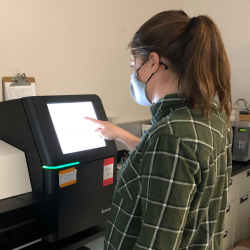Genetics Program at the Alaska Fisheries Science Center
The primary goal of the AFSC Genetics Program is to utilize genetic tools to inform management of marine resources, primarily fish and crabs. Genetic tools have the advantage of identifying subtle clues that are not recognizable using typical experimental design. For example, DNA shed by marine species (environmental, or eDNA) can track the presence of species in the ocean, even without a net. DNA has been used to track the number of Atka mackerel contributing to a fertilized egg cluster (more than 2!) and can sometimes even help identify new species.
Our three primary focal areas of research are: (1) conducting genetic stock identification on salmon caught as bycatch or in targeted fisheries to provide required information for regional, national, and international agreements and treaties, (2) investigating the stock structure and stock-specific distribution patterns of federally managed species to inform stock assessments and fisheries management, and (3) using environmental DNA and other molecular tools to understand species diversity, distribution, phenology, and ecology. In addition, we have recently started looking at how changes in the marine environment affect gene expression. Some of our current research includes determining the origin of Chinook and chum salmon stocks incidentally caught (bycatch) in the Bering Sea and Gulf of Alaska groundfish fisheries, investigating stock structure and adaptation of rockfish, Pacific cod, and sablefish, and using eDNA to investigate species diversity in a changing Arctic and in deep sea environments near coral aggregations. We are also looking at differences in the gene expression in red king, tanner, and snow crab under different ocean acidification conditions and plan to expand this research to fish.
